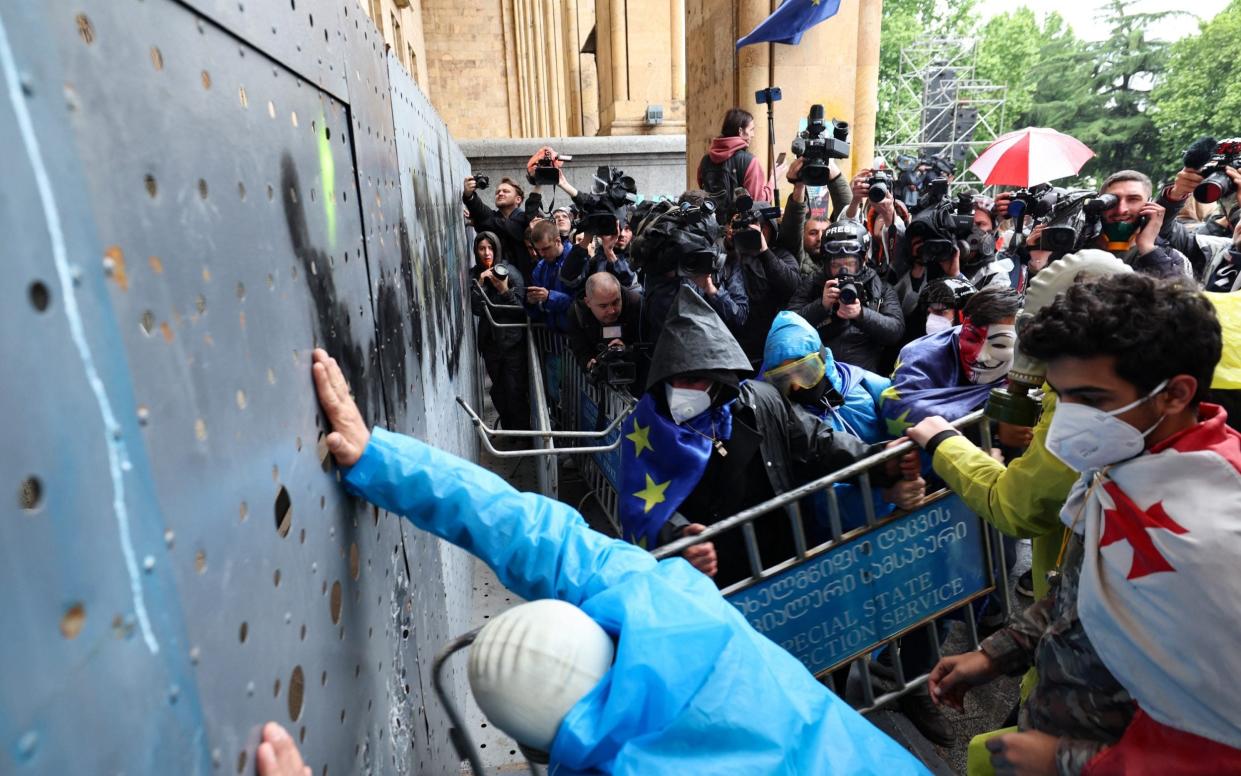Violent protests outside Georgian parliament as ‘foreign agents bill’ approved

Georgian protesters smashed barriers outside the national parliament on Tuesday as lawmakers approved the final reading of a controversial “foreign agents” bill which has triggered weeks of mass protests.
Protesters used metal bars to break through the barricades, with some managing to squeeze through, as tensions soared over a bill which critics say will impose Russian-style restrictions on the media and civil society.
Riot police grabbed several protesters and hauled them aggressively away as they moved in to clear the demonstrations.
It came after a brawl broke out in Georgia’s parliament earlier on Tuesday when an MP from the ruling Georgian Dream party, Dimitry Samkharadze, charged at Levan Khabeishvili, the chair of the opposition.
Both politicians have clashed bitterly over the new bill, which requires the media, NGOs and nonprofits to register as foreign agents if more than 20 per cent of their funding comes from abroad.
While the government says the bill is a necessary step to curb foreign influence, the opposition has branded it the “Russian law” as Moscow has used similar legislation to clamp down on journalists and other critics of Vladimir Putin.
The US State Department has also referred to it as “Kremlin-inspired” for the same reasons and had urged Tbilisi not to pass the law, as did the EU.
Hundreds of thousands of Georgians have taken to the streets opposing the bill in what has amounted to mass demonstrations against Russian influence over the South Caucasus state.
Many demonstrators have clashed with police, who in turn have resorted to firing tear gas and beating up Georgians who have gathered outside the parliament. A number of opposition figures have also been attacked after speaking out against the so-called Russian law.
One protester outside parliament told Sky News that they feared the law would bring Putin-style authoritarian rule to Georgia. “Our government is a Russian government, we don’t want Russia, Russia is never the way, I’m Georgian and therefore I am European,” they said.
On Tuesday, a majority of MPs approved the law in its third and final reading, and while it is likely to be vetoed by Salome Zourabichvili, the Georgian president, the governing party has enough support in the parliament to overrule her.
Earlier, Irakli Kobakhidze, the prime minister, had warned that if the bill didn’t pass the third reading then it would amount to a loss of sovereignty, and that Georgia would then “easily share the fate of Ukraine”, without elaborating further.
With the law now expected to come into force despite the mass unrest, there are also concerns that it could damage Georgia’s prospects of eventually joining the European Union.
“If they want to join the EU, they have to respect the fundamental principles of the rule of law and the democratic principles,” Charles Michel, the president of the European Council, said in reference to the bill on Tuesday.
Georgian Dream, the ruling party, attempted to pass an almost identical bill last year but abandoned the legislation in the face of mass protests and public pressure.

